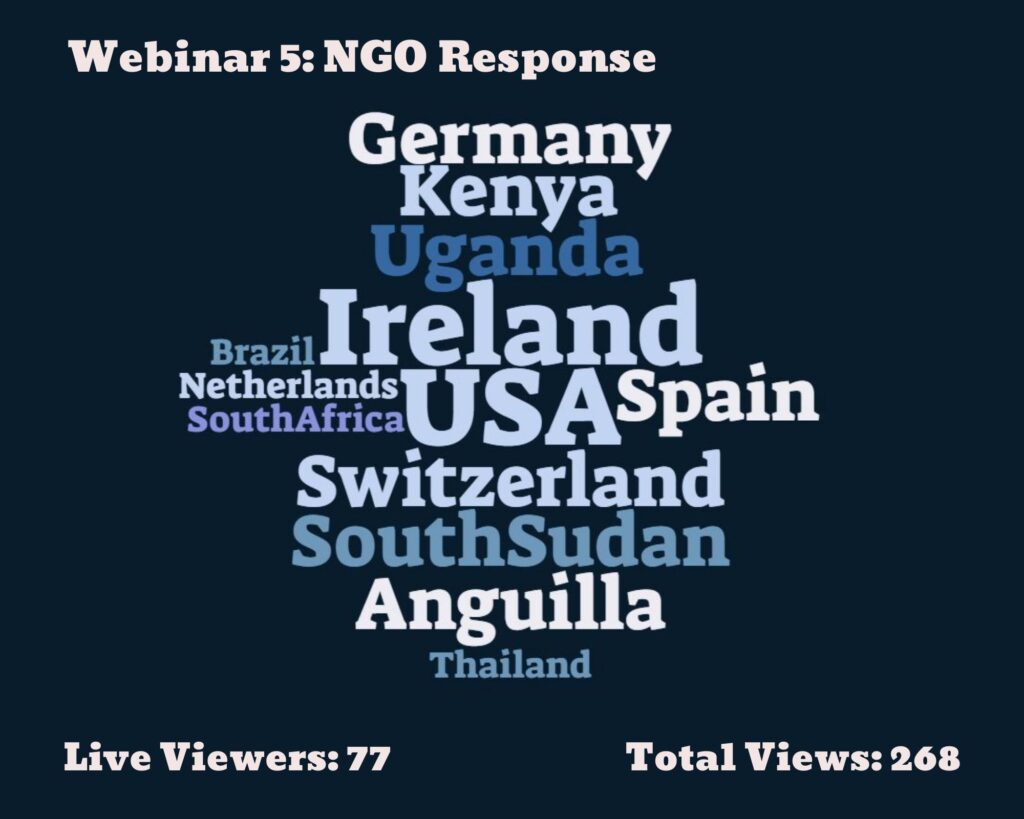Conversations on COVID-19 5th Webinar: How can health & development NGOs best respond during COVID-19?
 WEBINAR SERIES: WEEK FIVE How can health & development NGOs best respond during COVID-19?
WEBINAR SERIES: WEEK FIVE How can health & development NGOs best respond during COVID-19?
VIEW THE WEBINARCOMPLETE WEBINAR EVALUATION
The fifth webinar was held on Friday 17/04/2020 at 12:00 pm GMT/1PM Irish Time.
A SUMMARY OF POINTS MADE
Dr Gabriel Fitzpatrick, Specialist in Public Health Medicine with the HSE, formerly of Médecins Sans Frontières (MSF)
MSF usually responds to 3 outbreaks: the actual disease outbreak; the outbreak of fear and misinformation; and the shut-down of community health care facilities etc. that deal with those with chronic illnesses unrelated to outbreak.
Key element: Knowledge of local context/population – this depends on local recruitment & knowledge of vulnerable groups.
The experience of those who work in countries with reduced healthcare facilities is vital during COVID-19 – resource use is far more rational in low-resource settings eg. PPE lasting longer, operational expertise. Practical, operational experience is more important than academics in the first stage of an outbreak.
Daniel Muhungura, Regional Health Advisor, GOAL
GOAL is in 8 African countries currently: COVID-19 numbers are still low, but testing facilities are greatly reduced in these countries, so reporting is likely inaccurate. Refugee camps remain high-risk areas for those living within them. Many of these countries have implemented movement restriction measures.
GOAL focuses on 2 areas initially: risk communication & community engagement; infection prevention and control. Support of community-led action approaches is vital, along with bolstering facilities directly. Water supply and hand-washing is also a focus, along with support to non-COVID-19 related disease treatments.
Anne O’Mahony, International Programme Director, Concern Worldwide.
COVID-19 pandemic is not just a health crisis anymore; economic downturn is having huge effect, both in Ireland and around the world. Most of those whom Concern work with have jobs in the informal sector, so Concern are focusing on: Adapting programmes: increasing cash transfers; Improving access to water; Messaging: issues with conflicting advice for different diseases – Do No Harm – What is the most reasonable messaging to use?
Consequences of global shut-downs for LMICs could easily become more deadly than the disease itself eg. lowered measles vaccination, food insecurity, financing of other health responses etc.
Local supports in mask making, soap-making etc., responding to unemployment in clothing factories – OXFAM are estimating that COVID-19 could set progress towards SDGs could be set back by 20 years.
Malnutrition down the road and poverty created by shut-downs.
Suzanne Keatinge, Chief Executive Officer, Dóchas
NGOs are coming together and seeing this as broader than a simple humanitarian approach. Support for healthcare staff, moving to virtual communication and maintaining programmes as much as possible. As Ireland begins to plan for phasing in fewer restrictions, in LMICs the COVID-19 response is just beginning.
Funding for LMICs and even within European countries is re-allocated money rather than new funding for the crisis: how do we begin to rise to the challenge of the crisis in LMICs, and maintain a sense of momentum and urgency for supporting low-resource settings?
Learn from austerity: Ireland and the humanitarian sector became much more risk-averse and Ireland-centric – in the future, collaboration and flexibility are vital. Irish Aid have managed this relatively well: connecting with NGOs and pushing out grants; International Development Policy “A Better World” has never been more relevant. However, still strong risk culture here, and with other NGOs. Relying on public fundraising will present an issue down the line. Localisation and community response is vital, and COVID-19 can be used as an opportunity to make this work.
Siobhan Walsh, Chief Executive Officer, GOAL
Changes to Global infrastructure – of necessity moving to people-centric focus. Rapid adaptation to support colleagues in the field is the real challenge. Cyber-security during the pandemic is a new focus; technical teams under pressure; communication with communities; and online training of personnel.
Engaging with donors has often proven positive – flexibility and adaptation seen by many. Need for doubling down on humanitarian principles of organisations during the crisis – having courage to make decisions in real-time in an uncertain times. Negotiating ability to move within countries with their various governments in order to ensure continuation of established programmes in LMICs.
Community-led action approach will be fundamental in turning the tide in the pandemic. Support of health systems and ministries is a major practical focus for GOAL. Innovative information campaigns have ensured many people’s safety in Zimbabwe and Sierra Leon.
NGOs have a responsibility to continually be looking ahead to the longer-term effects of this global crisis.
Webinar Anchor: Ruairi Brugha, Professor Emeritus, Former Head of the Department of Public Health & Epidemiology at the Royal College of Surgeons in Ireland
View Ruairi’s COVID-19 Stats Updates
Download Ruairi’s Powerpoint Presentation

CATEGORIES
- Restore Humanity Campaign
- Equity in Action Blog
- Training Programmes
- Sponsorship
- Vaccine Equity
- Get Global – Global Health Talks
- Student Outreach Team
- Get Global Young Professionals Talk Global Health
- Global Health Matters – Live Event Series
- Global Health Matters – IGHN Live Event Series
- An initiative of Irish Global Health Network
- ESTHER Ireland and ESTHER Alliance for Global Health Partnerships
- Global Health Matters – Webinar Series
- ESTHER
- IGHN Conferences
- Global Health Conference 2020
- Women in Global Health – Ireland Chapter
- ESTHER Partnerships
- Weekly Webinar Series
- 4th Global Forum on HRH
- Access to Medicines
- Archive Page Weekly COVID Webinars
- Clean Cooking 2019
- Climate Change and Health Conference 2017
- Conference Abstracts
- Conference Materials
- Covid FAQ
- COVID Funding Opportunities
- COVID-19
- COVID-19: Gender Resources
- Dashboard and online resources
- Education
- ESTHER Alliance
- Events
- Events & News
- Funding covid
- Global Health Exchange 2018
- Global Health Exchange 2019
- Global Health symposium 2019
- Health Workforce/HRH
- Homepage Featured
- Homepage recent posts
- IFGH 2011-2012 Conference and Events
- IFGH 2014 Conference
- IFGH Multimedia
- Irish AIDS Day 2017
- Irish News and Feeds
- Key Correspondent Articles
- Key Correspondent News
- Maternal Health
- Multimedia
- News
- News & Events
- Newsletter
- Opportunity
- Our LMIC's Resources for COVID19
- Partner Country News and Feeds
- Past Events
- Policy
- Presentations
- Recurring events
- Reports & Publications
- Research
- Resources
- Student Outreach Group
- Students Corner
- TEDTalks
- TRAINING COURSES FOR HEALTH CARE PROFESSIONALS
- Uncategorized
- Upcoming Events
RECENT POSTS

Impact testimonies- Lombani

Impact Testimony – Shadrick

Power, Inequality, Decolonisation – and Living My Recovery By Bronwyn April

Global Health Without Borders: Reflections on the Power of Diverse Voices

IGHNxEU – Empowering Women for a Healthier Europe

